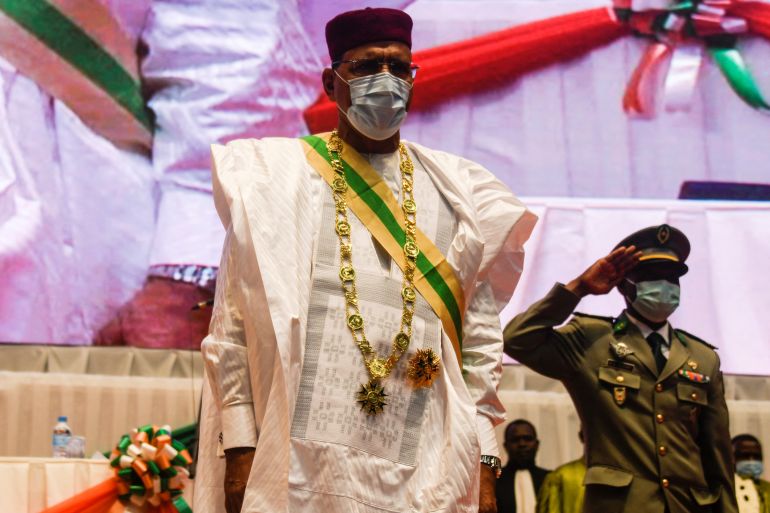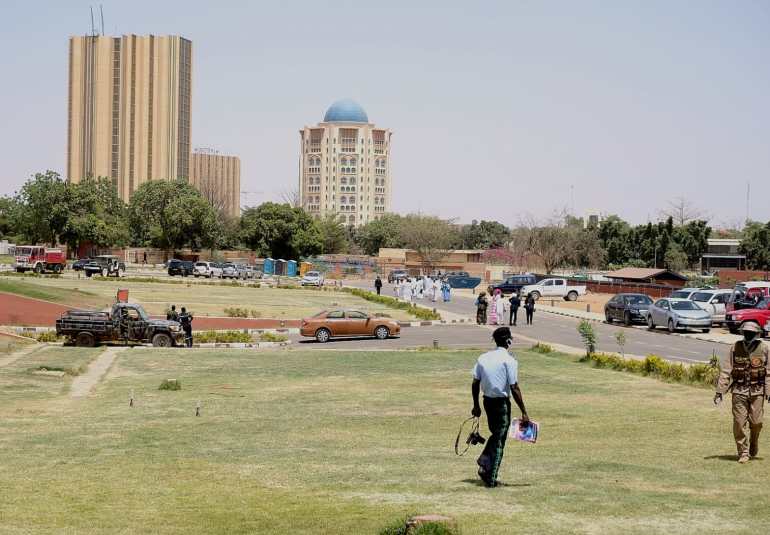Mohamed Bazoum sworn in as Niger’s president amid tensions
Dozens of foreign dignitaries attend the ceremony in Niamey taking place two days after the government said it foiled a coup attempt.

Niamey, Niger – Mohamed Bazoum has promised to improve security and education while being sworn in as Niger’s new president, in the country’s first democratic transition of power since independence in 1960.
The inauguration ceremony on Friday in the capital, Niamey, was attended by dozens of foreign dignitaries, including government representatives from 20 countries.
Keep reading
list of 3 itemsNiger observes three days of national mourning after carnage
Niger: Attack on presidential palace an ‘attempted coup’
Security measures were at their highest level, with armoured vehicles and pick-up military cars loaded with machine guns deployed in the city centre, two days after the government said it had thwarted a coup attempt.

The 61-year-old Bazoum won a contested presidential runoff vote in February to succeed Mahamadou Issoufou, who stepped down after completing his two five-year terms in office – a period characterised by growing insecurity and attacks by armed groups along the country’s border with Mali, Burkina Faso and Nigeria.
Bazoum, whose victory was confirmed by the Constitutional Court on March 21, began his speech by paying tribute to the first political steps of his Party for Democracy and Socialism (PNDS) ruling party more than 30 years ago, before turning his attention to the need to invest in education, tackle corruption and improve security.
‘Big and growing young population’
One of the world’s poorest countries, Niger saw its gross domestic product grow annually by five to six percent from 2016 to 2020, until the coronavirus pandemic hit the country.
Bazoum, who ran under the campaign slogan “to consolidate and progress”, has pledged to implement his so-called “Renaissance – Act 3” programme – an ambitious plan to boost the economy and attract new investors, as well as stabilise border areas and improve the governance of the public sector. It builds on the first two “Renaissance” programmes, first launched by Issoufou in 2011.
“Niger has the strongest demographic growth globally,” declared Bazoum at the ceremony held at the brand-new Mahatma Gandhi International Conference Centre.
“We have a big and growing young population and this pushes us to improve our educational system, with a special attention to the inclusion and literacy of young girls,” he added, while also promising investments in the health sector.
The battle against fighters linked to ISIL, Boko Haram and other groups was central to Bazoum’s address.
Tracing back the origins of the violence in the country’s west to the conflict that erupted in neighbouring Mali in 2012, spilling over into Niger from 2016 onwards, Bazoum said Niger will support Mali in re-establishing its full sovereignty, in collaboration with former colonial power France and Algeria.
A reinforcement of the security sector and a stronger capacity of the armed forces will be crucial to defeat the armed groups, said the president, adding that new military infrastructure, more soldiers and better equipped special units will have to go hand in hand with a transparent system and regular financial audits.
This was an apparent reference to the so-called “Ministry of Defence scandal”, a huge corruption scheme that rocked the previous government last year in connection to unfair bidding practices and inflated prices for the purchase of military equipment.
The great absentee in the ceremony was the political opposition.
None of the leaders of the parties comprising the CAP 20/21, the major opposition coalition that supported Mahamane Ousmane, Bazoum’s election rival, showed up at the event.
On March 8, Ousmane contested the result of the polls and appealed to the Constitutional Court for a review. Days before the transfer of power, he had called for the organisation of “peaceful” protests across the country from March 30 onwards.
However, demonstrations were blocked after the foiled coup attempt early on March 31.
On Thursday, the opposition coalition issued a statement in which it described the alleged coup attempt as an excuse “to arrest opposition leaders and members” and called for a parliamentary commission of inquiry into the issue.
It has not made any other public statements since.
A new government is expected to be announced over the next 10 days.